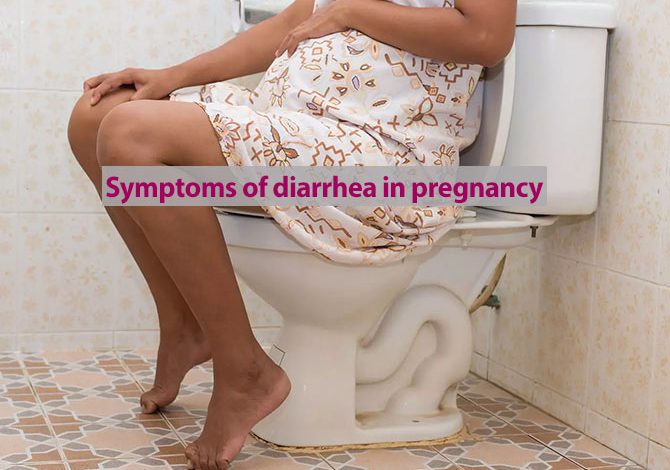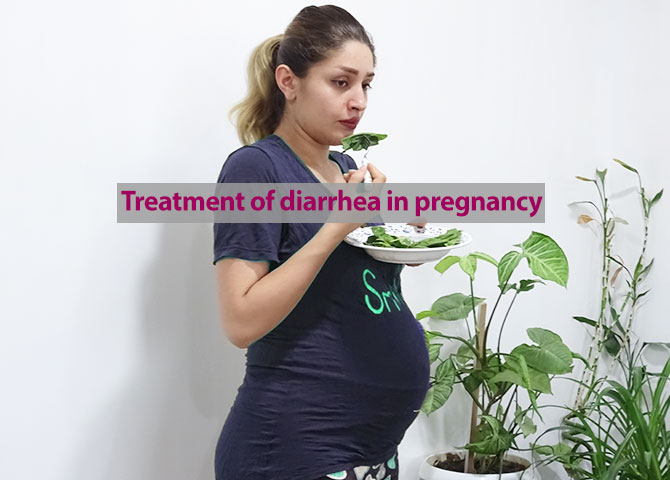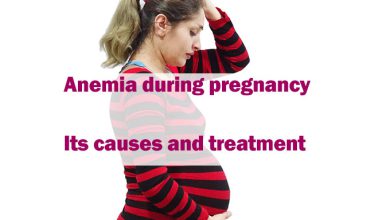Diarrhea During Pregnancy

Is it normal to have diarrhea during pregnancy? Digestive problems like constipation and diarrhea are common during pregnancy due to hormonal changes, dietary changes, physical changes, and maternal stress. However, they may not be related to your pregnancy and could be caused by an infection or intestinal disorder.
While some women do not take digestive problems like diarrhea seriously during pregnancy, if they have severe or persistent symptoms, they can cause complications like dehydration and malnutrition. During pregnancy, these complications are harmful to both the mother and the fetus. So if your digestive problems don’t go away in a few days or get worse, it is better to get treatment.
Drink plenty of water and avoid soft drinks and coffee. Diarrhea is rarely life-threatening, but it should not be taken lightly. Unfortunately, some women don’t take this problem seriously, thinking that diarrhea is related to pregnancy and sex, and suddenly face serious complications. From a scientific point of view, it is not possible to determine the sex of the fetus through the time of diarrhea in pregnancy.
In this article, we’ll take a closer look at what can cause diarrhea during pregnancy and what you can do to ease the symptoms.
Related posts: Constipation during pregnancy
Symptoms of diarrhea in pregnancy
If you have three or more loose or watery stools in one day, you probably have diarrhea. Other symptoms of heartburn and diarrhea in pregnancy include the following:
- Flatulence
- Abdominal cramps
- Stomach ache
- Muscle cramp
- The feeling of urgency to go to the toilet.
- Headache caused by dehydration
- Weakness and fatigue
Different causes of diarrhea in pregnancy
If your diarrhea is caused by pregnancy, it happened for the following reasons:
-
Hormonal changes:
This problem may slow down the movement of the digestive system and cause constipation or speed up the movement of the digestive system and cause diarrhea. One of the changes that can cause diarrhea is an increase in prostaglandin levels.
Although prostaglandins, like oxytocin, help stimulate contractions in the uterus, they can also increase the movement of food through the digestive tract. If stool passes through the intestines too quickly, it can cause diarrhea. The main causes of diarrhea in the first and second months of pregnancy or diarrhea in the third month of pregnancy can be mentioned.
-
Medication Side Effects:
Doctors usually use the medication misoprostol to induce labor. A synthetic type of prostaglandin that has side effects such as diarrhea. Of course, your obstetrician/gynecologist will discuss this with you before prescribing any medications during pregnancy.
-
Dietary Changes:
Many women make changes to their diet since they find out they are pregnant. Dietary changes can upset your stomach and potentially cause diarrhea. This is one of the main causes of diarrhea in the first three months of pregnancy.
-
New Food Sensitivities:
Food sensitivities can be one of the changes that occur during pregnancy. Foods that you tolerated well before pregnancy can now cause gas, stomach pain, or diarrhea.
Prenatal Vitamins:
Taking prenatal vitamins is good for your health, as well as the health of the developing fetus. But these vitamins can upset your stomach and cause diarrhea. Sometimes diarrhea in pregnancy is not necessarily due to pregnancy and you need to look for other causes. We will refer to its details below.
-
Infectious diarrhea in pregnancy
Intestinal infection is one of the most common causes of diarrhea. In addition to loose, watery stools, pregnant women with infectious diarrhea may also experience the following symptoms:
- Bloody stools
- Nausea and vomit
- Age
- Dizziness or lightheadedness
Some of the microorganisms that can cause infectious diarrhea include:
- Bacteria such as Escherichia coli, Campylobacter, Salmonella, or Shigella
- Viruses, including noroviruses and rotaviruses
- Parasites such as Giardia lamblia and Cryptosporidium enteritis
These microorganisms are usually transferred into the body as a result of food poisoning and consumption of contaminated food or water.
Related posts: What causes pregnancy after tubal ligation?
Intestinal disorders in pregnancy
Chronic diarrhea can be a sign of intestinal disorders. Things like:
- Inflammatory bowel disease, including Crohn’s disease and ulcerative colitis
- Irritable bowel syndrome
- Celiac disease
In addition to diarrhea, the above conditions can cause a wide range of other symptoms, such as the following:
- Cramps and abdominal pain
- Gas and bloating
- Weight loss
- Fatigue
- Nausea and vomit
- Skin and joint problems
- Anemia
This is why we recommend that if diarrhea is accompanied by other symptoms, you should consult a gynecologist or gastroenterologist for further evaluation and consult the cause of diarrhea in pregnant women and its treatment.
Diarrhea prevention methods in the last month of pregnancy
Diarrhea in the third trimester, especially diarrhea in the last month of pregnancy, is not uncommon, and the probability of its occurrence increases as your due date approaches. It can occur just before childbirth or a few weeks before and is usually a sign of the body’s preparation for the occurrence of a complex phenomenon called childbirth.
If you have diarrhea in the 8th month of pregnancy or diarrhea in the 9th month of pregnancy, that doesn’t necessarily mean preterm birth or miscarriage. Therefore, you should not worry and pay attention to other signs of labor or miscarriage.
To prevent diarrhea in the seventh month of pregnancy and later, make sure you have a balanced diet that includes fruits and vegetables and avoids eating open-air food. Because the risk of food poisoning threatens you.
Control stress, as it is effective in the onset of diarrhea in pregnancy. If you have an underlying digestive condition, be sure to tell your obstetrician before pregnancy.
According to a US medical institute, you can prevent dehydration during pregnancy by drinking about 10 glasses of water a day.
Is diarrhea dangerous in pregnancy?
Diarrhea in pregnancy can be mild and go away quickly, or it can be more severe. Loss of water through the intestines can lead to dehydration, which is harmful during pregnancy. So, to prevent diarrhea from becoming dangerous, make sure you drink water and other fluids.
Signs and symptoms of dehydration include the following:
- Dry mouth
- Feeling dizzy, dizzy or may pass out
- Headache
- Decreased frequency of urination
- Urine that has a strong smell
- Very dark yellow or orange urine
Therefore, be sure to pay attention to these signs. If you’re dehydrated, your doctor can give you sterile intravenous (IV) fluids to bring your body back into balance. Sometimes, if you have repeated mild diarrhea, your doctor will order a blood test and an analysis of stool samples to check for the possibility of infectious diarrhea. Depending on the results, you may need to take antibiotics or other medications.
Does diarrhea in pregnancy cause miscarriage?
When you have diarrhea while pregnant, you may worry that something is wrong with your pregnancy or that it is a sign of miscarriage. It’s better to know that diarrhea is not a common cause or symptom of miscarriage.
Although some women experience diarrhea at the time of a miscarriage, having an episode of diarrhea does not mean that a miscarriage is imminent. If you are concerned about your pregnancy for any reason, you should talk to your doctor.
Treatment of diarrhea in pregnancy
We advise you to use home remedies in the first days of diarrhea in pregnancy. Because most cases of diarrhea tend to clear up without treatment or medication. Among the most effective solutions to treat diarrhea in pregnancy we can mention:

- Keep your body hydrated: Passing loose, watery stools removes a lot of fluid from your body. Dehydration can come on quickly and cause serious complications, especially if you’re pregnant. So it is better to drink water to replenish the fluids lost due to diarrhea. Consume some broth or soup to replace some of the electrolytes, vitamins, and minerals your body has lost. But try to avoid drinks that are high in sugar (such as unnatural juices), as they can aggravate diarrhea.
- Eat bland foods: The BRAT diet, often recommended for easing digestive issues like diarrhea, includes bananas, rice, applesauce, and toast. By absorbing excess water in the intestines, they cause the stools to harden. On the other hand, they have the power to replenish electrolytes.
- Avoid certain food groups: Try to avoid fatty, fried, or spicy foods. Also, try to limit your intake of caffeinated beverages (such as coffee, tea, and soda), milk, and dairy products. Because they make diarrhea worse.
- Review your medications: If you’ve been taking a medication that’s been causing diarrhea for a long time and your body hasn’t adjusted to it, talk to your doctor about changing your medication. Do not stop taking your prescribed medications without consulting your doctor.
- Add Probiotics to Your Diet: Probiotics are beneficial microorganisms that work in the digestive tract to create a healthy environment. When diarrhea is caused by antibiotic use, taking foods or supplements that contain probiotics can be effective.
If your diarrhea is the result of food poisoning and viral or bacterial infiltration, they are often eliminated from the body due to constant bowel movements.
Pharmacological Treatment of diarrhea in Pregnancy
Avoid using over-the-counter (OTC) medications to treat diarrhea. Not all of these drugs are safe for pregnant women. If needed, your doctor will recommend or prescribe the right medication for you based on the severity of your symptoms.
For pregnant women with severe dehydration, the doctor may suggest taking an oral rehydration solution to treat diarrhea in the last month of pregnancy or injecting sugar or salt serum.
New findings show that taking Lomotil can harm a fetus in the second and third trimesters. Peptobismol may increase the risk of low birth weight and perinatal mortality. Antidiarrheal drugs such as diphenoxylate-atropine or bismuth subsalicylate are not recommended during pregnancy.
diarrhea during pregnancy is a common concern that can be attributed to various factors. While it is usually a self-limiting condition that can be managed with simple remedies, it is crucial for pregnant women to remain vigilant about their symptoms and seek medical attention if necessary. By staying informed about the potential causes and preventive measures for diarrhea during pregnancy, expecting mothers can ensure a healthy pregnancy and delivery.
When should we see a doctor?
If your diarrhea lasts longer than 2-3 days or if it is severe, call your doctor. A pregnant woman should seek immediate medical attention if she experiences any of the following symptoms:
- Passing stools that contain blood or pus
- Diarrhea lasting more than 48 hours
- Passing more than 6 soft stools in a 24-hour period
- Fever of 39 degrees Celsius or higher
- frequent vomiting
- Severe pain in the rectum or abdomen
- signs of dehydration
Is it normal to have diarrhea during pregnancy?
Does diarrhea affect the baby during pregnancy?
Is diarrhea a symptom of miscarriage?
What causes diarrhea during pregnancy?
In conclusion, diarrhea during pregnancy can be a common occurrence, and it is typically caused by factors such as dietary changes, hormonal fluctuations, or gastrointestinal infections. In most cases, the condition can be managed through home remedies such as dietary adjustments and increased fluid intake. However, if the symptoms persist or become severe, it is essential to seek medical attention to rule out any underlying health issues that may require treatment.
It is important for pregnant women to maintain good hygiene practices and consume a healthy and balanced diet to minimize the risk of developing diarrhea during pregnancy. Additionally, seeking prenatal care and discussing any concerns with a healthcare provider can help ensure a healthy pregnancy and delivery.
